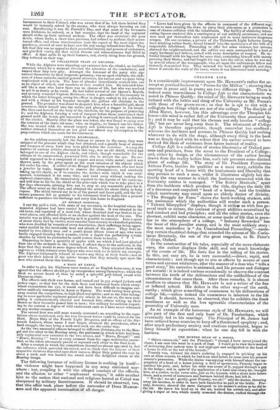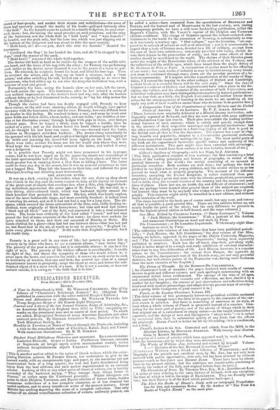COLLEGE LIFE
Is a considerable improvement upon Mr. HawLETT's rather flat at- tempt at poetical humour in " Poems for the Million " ; showing that success in prose and in poetry are two different things. There is indeed some resemblance in College Life to the characteristic we noted in Phineas Quiddy ; the mind of Mr. HEWLETT being as much imbued with the habits and slang of the University as Mr. PooLE's with those of the green-room ; so that he is apt to tint with a collegiate hue things which are not of the college. The disciple of Alma Mater, however, has this advantage over the Thespian fol- lower—his mind is rather full of the University than possessed by it ; and it may be said that his themes not only involve " college life," but are never long away from it. The treatment of College Life is therefore appropriate, though somewhat too confined ; whereas the incidents and persons in Phineas Quiddy had nothing whatever to do with the stage, although every thing in the book was so deeply dyed with its colour that the author seemed to have derived his ideas of existence from farces instead of reality.
College Life is a collection of stories illustrative of Oxford per- sons and practices, from the scout to the President of a College ; and, either by design, or the circumstance of the author having drawn from the reality before him, each tale presents some distinct phase of college life. The story of Mr. President Pomponius Atticus Potts, besides its qualities as a mere story, exhibits the sporting head of a house with the bonliommie and liberality that may pertain to such a man, whilst it illustrates slightly but dis- tinctly the easy manner in which the business connected with the University estates is managed. " The Soirée Musicale," apart from the incidents which produce the title, displays the daily life of a decorous and corpulent " head of a house," and the troubles which matrimony may entail upon an elderly doctor of divinity. " The Struggle for Fame " shows the hard-working student, and the assistance which the authorities will render such a person. " Talents Misapplied" displays, though it strikess us with less ge- neral truth or nature, the contrast of great abilities neutralized by bad conduct and bad principles; and all the other stories, even the shortest, exhibit some character, or some mode of life that is pecu- liar to the atmosphere of a college. " Industry Rewarded" has the least of this peculiar stamp, and is the most unlikely story : the most matterless is " An Unacademical Proceeding,"—narra- ting certain theatrical doings that attended the advent of Mr. Corio- 'anus Strutterly, the son of the great tragedian, to St. Peter's College, Oxford.
In the construction of his tales, especially of the more elaborate ones, the author displays little skill, and not much knowledge of the events of life. His forte lies in the telling of his stories. In this, not easy art, he is very successful,—direct, rapid, and characteristic ; and though apt to aim at effects by means of cant terms and current witticisms, after the manner of a man who " tells a good story," his narrative is animated, and his persons and dialogue are natural : it is indeed curious occasionally to observe the contrast between the truth of the delineations and the unlikelihood of the circumstances that cause them. After these remarks, it is almost needless to observe that Mr. HEWLETT is not a writer of the fine or inflated school. His defect is the other way—of the earth, earthy ; which gives something of coarseness to his delineations of college life —unless indeed the coarseness is inherent in the life itself. It should, however, be observed, that he exhibits the frank manliness as well as the less agreeable characteristics of the generality of University men.
As an example of the humorous style of Mr. HEWLETT, we will give part of the first and only hunt of Dr. Fussbotham, which eventually led to his marriage. The Principal of St. James had been ordered horse-exercise to keep off a threatened apoplexy ; and, after much preliminary anxiety and cautious experiment, began to fancy himself an equestrian ; when he one day fell in with the harriers.
THE HUNTED HEAD OF A HOUSE.
" Odora canum vis," said the Principal; " though I have never joined the chase, I am sure this must be a pack of dogs. I would go to view their method of destroying fine nature were it not improper and undignified in the head of a house to ride at the tail of the hounds."
Prosody was, without his rider's noticing it, engaged in pricking up his ears at these sounds, to which he had been used before he came into his present master's possession. While the doctor was arguing with himself about the im- propriety of a head of a house joining a field of sportsman, Prosody began to quicken his pace, and, before his rider was aware of it, popped through a gap in the hedge; and in spite'of the application of a hard-and-sharp bit, brought him, at a canter, to the cover-side, just as the hounds, with a stout hare before them, and a crowd of horsemen and footmen behind them, had left it.
" Wo -eh ! wo-ah ! gently, good Prosody, wo-ah ! " said the doctor, throwing away his bamboo, in order to have both hands free to pull at the bridle. Pro- sody, however, showed the same disregard to his master's orders as he did to the bit. He threw his head up in the air, hoisted his switch-tail, and after giving a caper or two, which nearly unseated the doctor, rushed through the
crowd of foot-people, and amidst their shouts and maledictions—for some of them had narrowly escaped the marks of his hoofs—galloped furiously after " the field." As the hounds came to a check in a double hedgerow, he soon over- took them; but, disdaining the usual practice on such occasions, and the cries of the huntsman and the whole field to " hold hard," and " ware hounds!" he headed, not the pack only, but the hare too, which was just slipping out at the bottom of the hedgerow and was about to take the open country.
" Hold hard, Sir! d—n you, don't ride over the hounds!" shouted the huntsman.
" Confound the Guy ! he has headed the hare, and she'll be chopped by the dogs," cried the master of the pack.
Hold hard!" screamed the whole field together.
The doctor did hold as hard as be could—by the crupper of the saddle with one hand, and the mane of his nag with the other ; fur Prosody was performing such antics as the doctor never dreamed it was in the power of a horse to per- form. He winnied, he neighed; tossed his head, and lifted his fore-legs. Then he reversed the action, and, as they say on board a steamer, took a turn astern,' and after switching bis tail, kicked out so vigorously as to cover the huntsman, who bad ridden up to see who the irregular individual was, with a mixture of mud and gravel.
Fortunately the hare, seeing the hounds close on her scut, left the cover, and took across the open. The huntsman, after he had uttered a string of very unkind imprecations on the doctor's head and wig, rode after the hounds without doing as he had threatened to do, namely, to" lay his whip across the old fool's shoulders."
Though the doctor bad been too deeply engaged with Prosody to hear these curses, or the still more alarming threat, lie would willingly have parted company with the huntsmen then and for ever. Prosody, however, differed from his master in this feeling. He resolved to have a run; and away he went over grass-fields and fallow-fields, wheat, barley, and oat-fields, ' per stubbles et tur- nips et tot discrimina rerum,' through hedges with gaps in them, over hedges without gaps. Now he leaped a ditch, anon he topped a hurdle, then he rushed at a gate ; and as the doctor beard his hoofs clatter against the top- rail, he thought his last hour was come. On—on—forward went the horse, reckless as Mazeppa's unbroken hackney. The doctor clung tenaciously to the pommel with his left hand, and employed his right alternately in tugging at the bridle and jamming his shovel-hat more tightly on his head. All his efforts were vain; neither his horse nor his hat would stop where they were. Wind kept the former going—wind removed the latter, and wafted it away over a hedgerow.
It is possible that Prosody might not have persevered in his improper
course, had he not been urged on by the approving shouts and screechings of the least sportsmanlike halt of the field. Fun was their object, and there was much greater fun in running down a Don than in killing a hare. The latter could he done any day in the season, but it was an unusual occurrence to turn out a bagged Dou. They left the hounds to their fate, and followed the poor Principal, hooting and shouting most irreverently.
THE REDUCED ACTOR.
It was on a dark evening in November, when the sun abuts up shop about
four o'clock in the day, and the moon cannot do duty as his deputy on account of the great-coat of clouds that envelops her, when a thin, slim, haggard-look- ing individual, approached the outer gates of St. Peter's. He was clad in a close-fitting, olive-coloured tunic, which was buttoned tightly around the black kerchief that protected his throat. Ills hat, which was nearly napless, was of the most fashionable shape, and most carefully brushed : it looked tired of covering its owner, and as if it had not had a nap for a long time. The sit- open's, which covered the lower extremities of the thin, cold, chilly-looking in- dividual, were originally of black kerseymere; but time and wear had beaten " black and all black" out of the field, and converted it into a mud-coloured brown. The boots were evidently of the kind called "footed," and had once graced the feet of some exquisite of the first water ; for there were sockets for spurs attached to them, and their cut savoured of Hnmby or Roby. His bands clubbed for a glove—they had but one between them—that was not put on, but flourished in the air, as much as to say to passers-by, " England ex- pects every glove to do his duty." It did more than England expected, for it did double duty.
POVERTY.
Poverty is a great evil in any state of life; but poverty is never felt so
severely as by those who have, to use a common phrase, " seen better days." The poverty of the poor is misery, but it is endurable misery : it can bear the sight of men. The poverty of the whilom affluent is unendurable : it avoids the light of day, and shuns the sympathy of those who would relieve it ; it preys upon the heart, and corrodes the mind ; it screws up every nerve to such an extremity of tension, that one cool look, the averted eye even of a casual acquaintance known in prosperity, snaps the chord at once, and leaves the self- despised object of it a mere wreck of a man. If he is not a maniac, or does not commit suicide, it is owing to " the faith that is in him."























 Previous page
Previous page